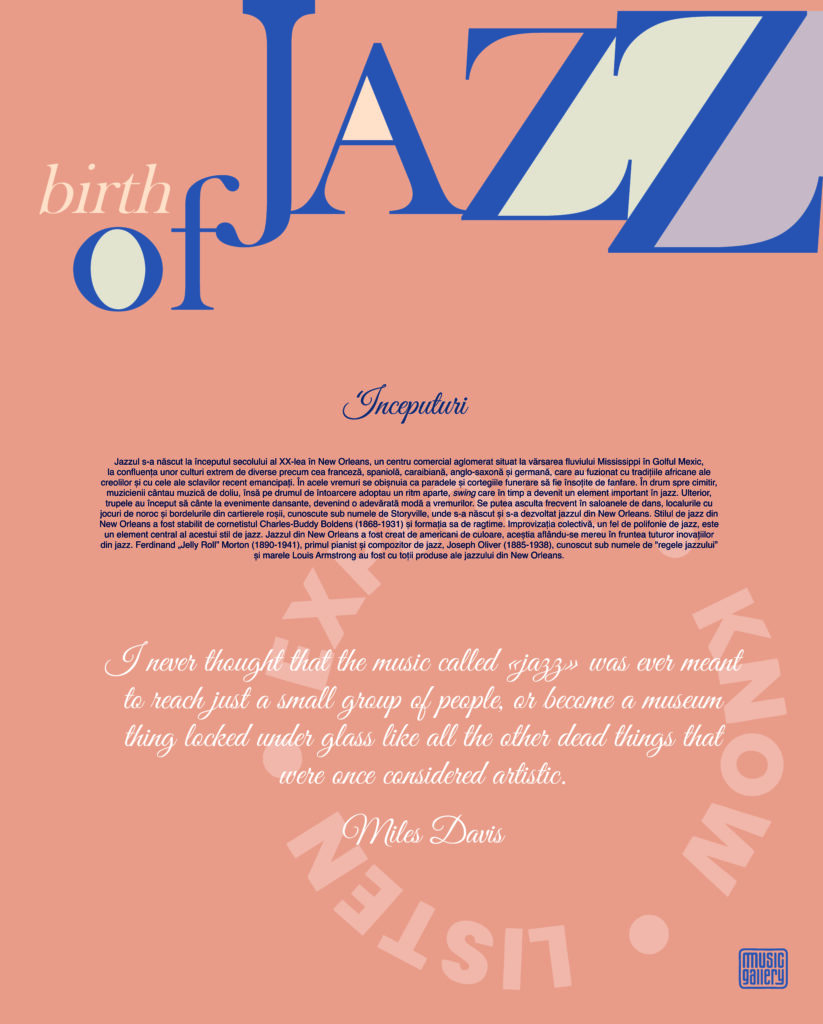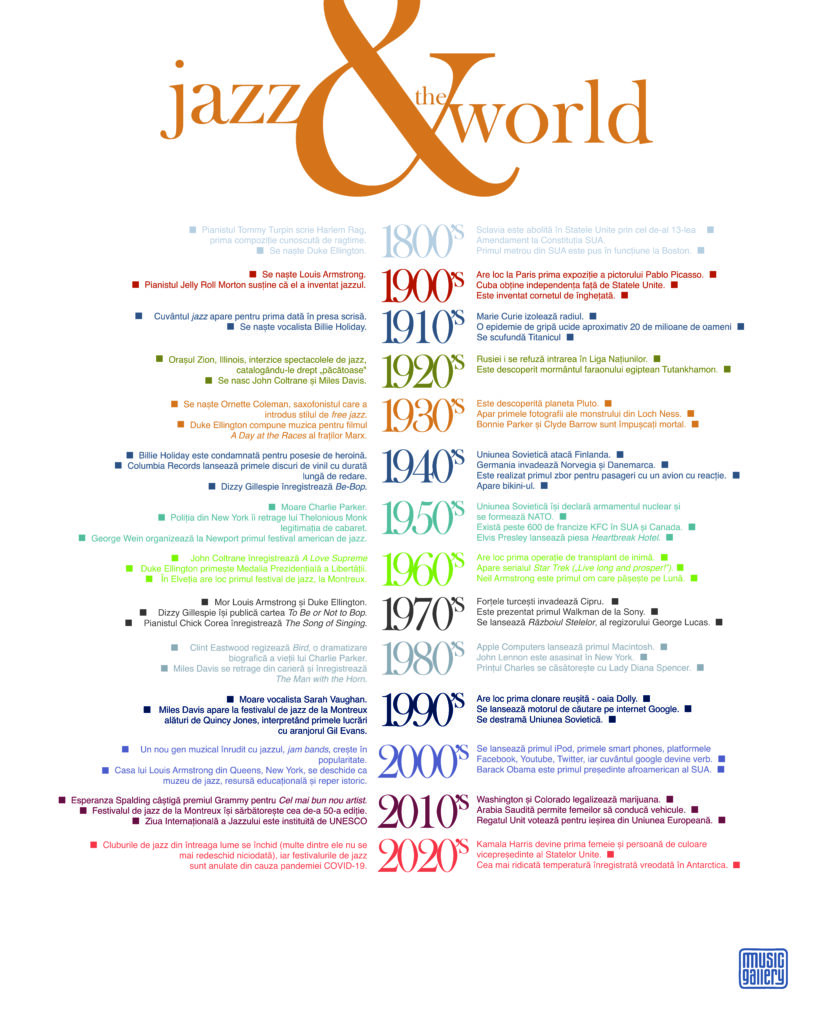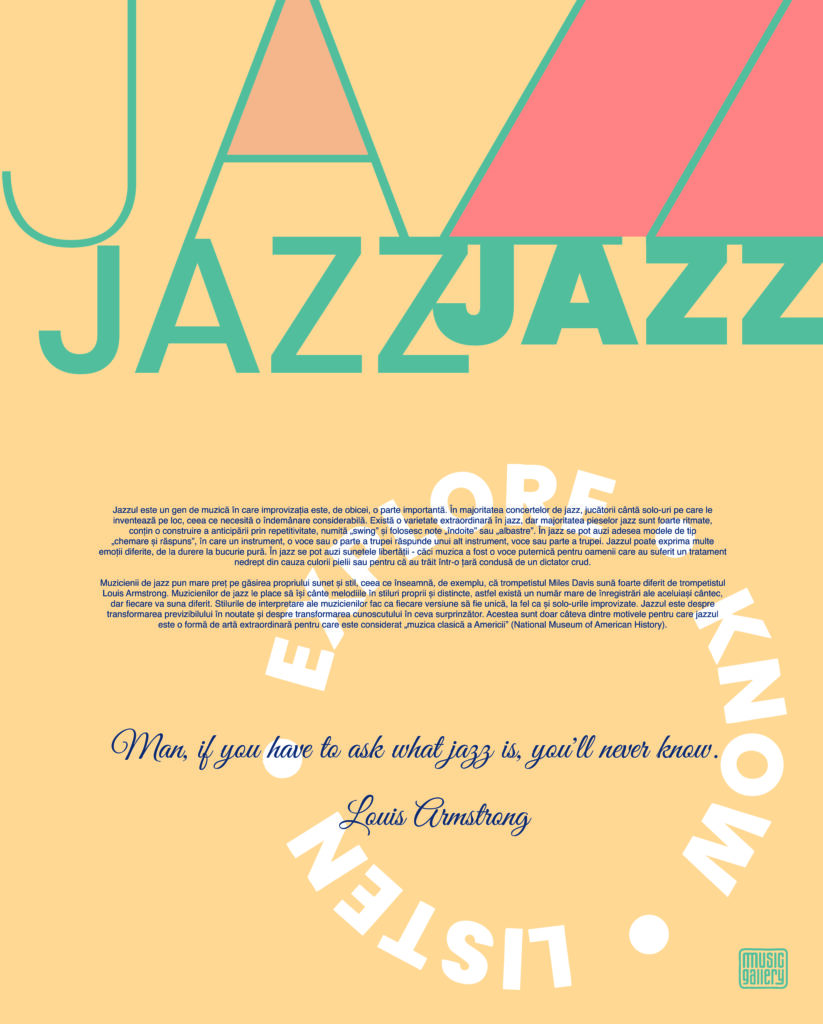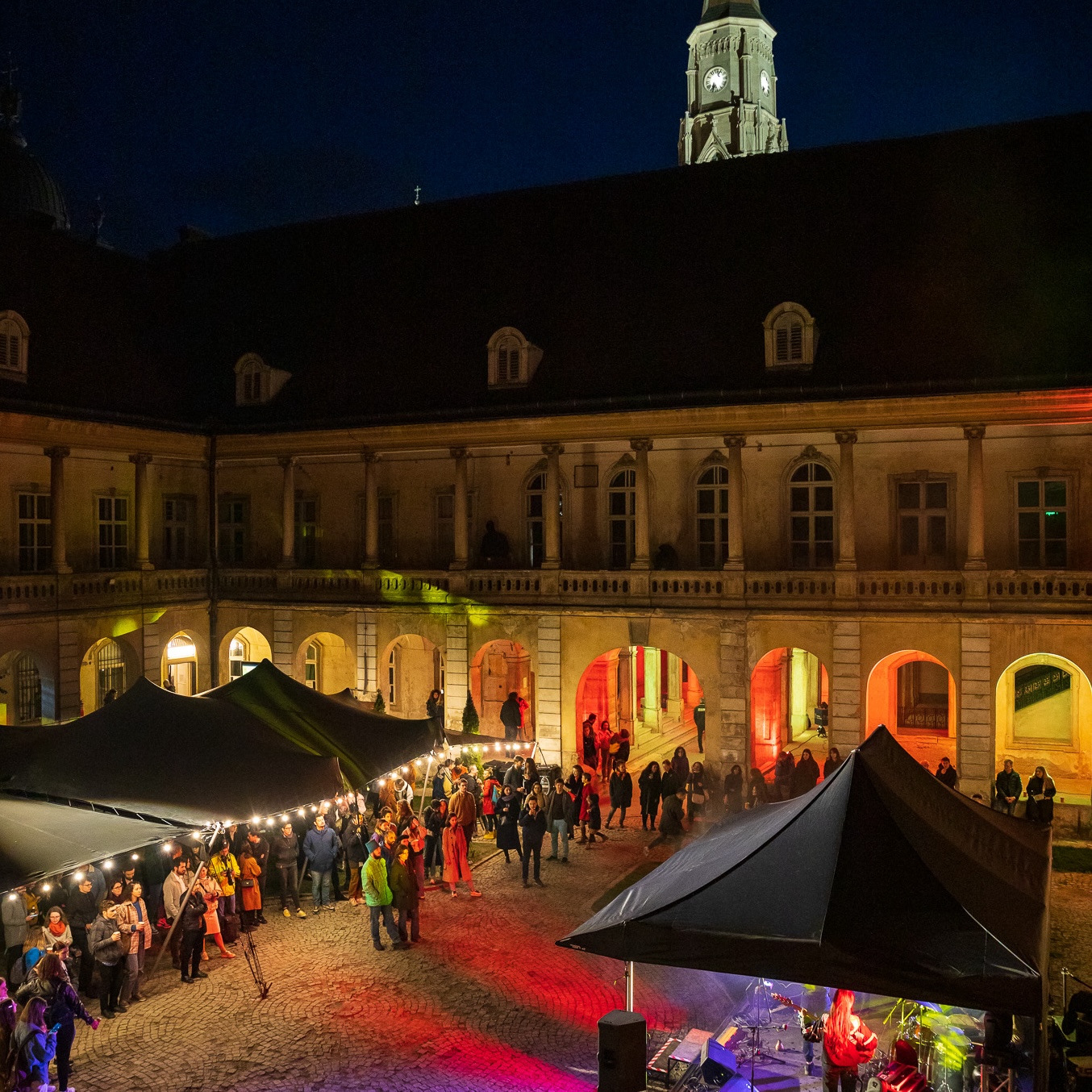Jazz…

(P22) BEGINNINGS
Jazz was born in the early 20th century in New Orleans, a bustling commercial center located at the mouth of the Mississippi River on the Gulf of Mexico, at the confluence of extremely diverse cultures such as French, Spanish, Caribbean, Anglo-Saxon, and German, which fused with the African traditions of creoles and recently emancipated slaves. In those times, it was customary for parades and funeral processions to be accompanied by brass bands. On the way to the cemetery, the musicians played funeral music, but on the way back they adopted a unique swing rhythm that over time became an important element in jazz. Later, bands began to play at dance events, becoming a true fashion of the times. Jazz could frequently be heard in dance halls, gambling dens, and brothels in the red-light districts, known as Storyville, where jazz was born and developed in New Orleans. The New Orleans jazz style was established by cornetist Charles “Buddy” Bolden (1868-1931) and his ragtime band. Collective improvisation, a kind of jazz polyphony, is a central element of this style of jazz. New Orleans jazz was created by African Americans, who were always at the forefront of all jazz innovations. Ferdinand “Jelly Roll” Morton (1890-1941), the first jazz pianist and composer, Joseph Oliver (1885-1938), known as the “King of Jazz,” and the great Louis Armstrong were all products of New Orleans jazz.
I never thought that the music called «jazz» was ever meant to reach just a small group of people, or become a museum thing locked under glass like all the other dead things that were once considered artistic. – Miles Davis

(P23) IN JAZZ | IN THE WORLD
Pianist Tommy Turpin writes Harlem Rag, the first known ragtime composition.
Duke Ellington is born.

Slavery is abolished in the United States through the 13th Amendment to the US Constitution.
The first subway in the US is put into operation in Boston.
Louis Armstrong is born.
Pianist Jelly Roll Morton claims to have invented jazz.

Pablo Picasso’s first exhibition takes place in Paris.
Cuba gains independence from the United States.
The ice cream cone is invented.
The word jazz appears for the first time in the written press.
Vocalist Billie Holiday is born.

Marie Curie isolates radium.
A flu epidemic kills approximately 20 million people worldwide.
The Titanic sinks.
The city of Zion, Illinois, bans jazz performances, calling them “sinful”.
John Coltrane and Miles Davis are born.

Russia is denied entry into the League of Nations.
The tomb of the Egyptian pharaoh Tutankhamun is discovered.
Ornette Coleman is born, the saxophonist who introduced the free jazz style.
Duke Ellington composes the music for the Marx Brothers’ film A Day at the Races.

The planet Pluto is discovered.
The first photographs of the Loch Ness Monster appear.
Bonnie Parker and Clyde Barrow are fatally shot.
Billie Holiday is convicted for heroin possession.
Columbia Records releases the first long-playing vinyl records.
Dizzy Gillespie records Be-Bop.

The Soviet Union attacks Finland.
Germany invades Norway and Denmark.
The first passenger flight with a jet plane takes off.
The bikini is introduced.
Charlie Parker dies.
New York police revoke Thelonious Monk’s cabaret card.
George Wein organizes the first American jazz festival in Newport.

The Soviet Union declares its nuclear armament and NATO is formed.
There are over 600 KFC franchises in the US and Canada.
Elvis Presley releases the song “Heartbreak Hotel”.
John Coltrane records A Love Supreme.
Duke Ellington receives the Presidential Medal of Freedom.
The first jazz festival in Switzerland takes place in Montreux.

The first heart transplant is performed.
The TV series Star Trek debuts. To that we say: “Live long and prosper!”
Neil Armstrong is the first man to walk on the Moon.
Louis Armstrong and Duke Ellington die.
Dizzy Gillespie publishes his book To Be or Not to Bop.
Pianist Chick Corea records The Song of Singing.

Turkish forces invade Cyprus.
Sony releases the first Walkman.
The Star Wars franchise is launched by director George Lucas.
Clint Eastwood directs Bird, a biographical drama about Charlie Parker’s life.
Miles Davis retires from his career and records The Man with the Horn.

Apple Computers releases the first Macintosh.
John Lennon is assassinated in New York.
Prince Charles marries Lady Diana Spencer.
Vocalist Sarah Vaughan passes away.
Miles Davis appears at the Montreux Jazz Festival with Quincy Jones, performing their first works with arranger Gil Evans.

The first successful cloning of a mammal, Dolly the sheep, takes place.
Google search engine is launched.
The Soviet Union collapses.
A new music genre related to jazz, jam bands, grows in popularity.
Louis Armstrong’s house in Queens, New York, opens as a jazz museum, educational resource, and historic landmark.

The first iPod, smartphones, Facebook, YouTube, Twitter, and the word “Google” becoming a verb are introduced.
Barack Obama becomes the first African American president of the United States.
Esperanza Spalding wins the Grammy Award for Best New Artist.
The Montreux Jazz Festival celebrates its 50th edition.
The International Jazz Day is established by UNESCO.

Washington and Colorado legalize marijuana.
Saudi Arabia allows women to drive vehicles.
The United Kingdom votes to leave the European Union.
Jazz clubs around the world are closing (many of them never reopening), and jazz festivals are canceled due to the COVID-19 pandemic.

Kamala Harris becomes the first woman and person of color to serve as Vice President of the United States.
The highest temperature ever recorded in Antarctica.

(P24) JAZZ, JAZZ, JAZZ
Jazz is a music genre in which improvisation is usually an important part. In most jazz concerts, players perform solos that they invent on the spot, which requires considerable skill. There is an extraordinary variety in jazz, but most jazz pieces are highly rhythmic, contain a sense of anticipation through repetition, called “swing,” and use “bent” or “blue” notes. Jazz often features call-and-response patterns, in which one instrument, voice, or part of the band responds to another instrument, voice, or part of the band. Jazz can express many different emotions, from pain to pure joy. Jazz can be the sound of freedom – as the music was a powerful voice for people who suffered unjust treatment because of their skin color or because they lived in a country ruled by a cruel dictator.
Jazz musicians place great value on finding their own sound and style, which means, for example, that trumpeter Miles Davis sounds very different from trumpeter Louis Armstrong. Jazz musicians like to play their melodies in their own distinct styles, so there are many recordings of the same song, but each will sound different. The musicians’ individual playing styles make each version unique, as do the improvised solos. Jazz is about transforming the predictable into something new and turning the familiar into something surprising. These are just a few reasons why jazz is an extraordinary art form and is considered “America’s classical music” (National Museum of American History).
Man, if you have to ask what jazz is, you’ll never know. – Louis Armstrong
